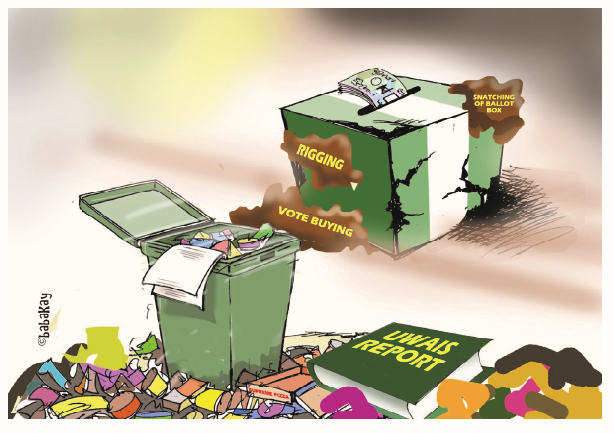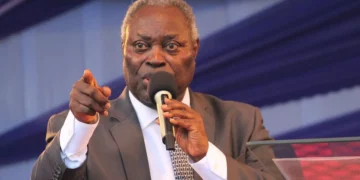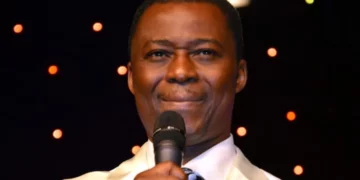The Nigerian Economic Summit Group held its 29th annual dialogue last week and if nothing else, the think tank deserves praise for its commitment to dialogue about Nigeria. I had the pleasure to join the ‘Our Future, Our Heritage’ panel moderated by Cynthia Mbamalu (YIAGA) along with Folusho Phillips (Phillips Consulting), Yanmo Omorogbe (Bamboo), Jamila Bio Ibrahim (Minister of Youth) and Mohammed Idris Malagi (Minister of Information and National Orientation).
Our task was to discuss national identity and pride, strengthening the democratic processes, talent retention and national development. We started off with a wonderful poem by Dike Chukwumerije, who would be a great choice for Nigeria’s poet laureate if we had that position. Many Nigerians have done wonderful things outside politics and governance but hard to tell from the headlines. I had no idea that ‘Dodan’ in Dodan Barracks is a town in Burma where Nigerian soldiers bravely fought and died during World War II.
Future of electoral reform
I was tasked with speaking about electoral reform but I found myself unable to. As I prepared for the panel, I wondered – what else is there to say about electoral reform? We have been talking about reforms since the 2003 elections with the most in-depth thinking done post the 2007 elections that many agree were particularly poor; presidential results announced when the count had not been completed and a glaringly uneven playing field for candidates and aspirants. Yar’Adua might be the only president since the 4th Republic began who admitted the elections that brought him into the Presidency were flawed. He set up the 22-member electoral reform committee chaired by former Chief Justice Muhammad Uwais to review elections and make recommendations.
Uwais Electoral reform committee took a historical view of Nigeria’s elections, identified some of the root causes such as flaws in the regulatory framework and made many useful recommendations that have been ignored since the report was submitted in 2010. One of the most important and consistently ignored recommendations is that we switch the electoral system from first past the post – which is what we practice, to proportional representation (PR) which would be more equitable for a country of our diversity and complexity. For instance, with PR, the 2023 presidential elections would have required a run off. No one with barely a third of the votes would be able to gain access to the presidency.
What comes first?
The history of electoral reform is not the focus of this article. The aim is to question the wisdom of continuing to focus on electoral reforms without regard to Nigeria’s political heritage and the national ethos regarding government.
Our elections are an expression of what we want for the country and indirectly, for ourselves. They are the embodiment of our politics and political economy. This is why despite all the time and resources sunk into electoral reform processes and elections, many Nigerians are increasingly dissatisfied with the integrity of elections, legitimacy of results and effectiveness of government.
3 recent news worthy events help to explain this thesis
The first is the debate about federal legislators spending N40bn on cars for themselves. At a time when the naira is losing value, inflation is 26.72 percent and economic hardship is affecting every household, many Nigerians have questioned the rationale and the legislators’ sense of responsibility. There isn’t any; that is why the behavior of PDP and APC legislators is no different from Labour Party members – this is their entitlement. Besides, we discuss what legislators spend on themselves almost every year…nothing changes. Getting into government is about self, time and turn and getting in is a glorious thing that triggers speaking in tongues, special prayers and reams of paper in public congratulatory messages.
The second is the P&ID judgement in the UK where once again we are reminded that government officials do not always take the best decisions for the collective good. In this case, public officers planned for Nigeria to pay out $11bn for a dubious contract in order to enrich themselves. Sometimes they use these funds to perpetuate themselves in office or place loyalists in key positions to ensure they remain close to the tap of public funds. Sometimes they blend into respectability – become matrons and patrons of society, elders who grace every occasion. Part of the reason is because we expect those in government to live better lives than the rest of us. We are disappointed, even disrespectful when those in government can’t show ‘anything’ for their time. Since this is what is important to us, our government will attract plunderers.
Third, is the indictment of the judiciary in the valedictory speech of Justice Dattijo Muhammad as he marked his retirement from the Supreme Court. He shared his reservations about how powerful the Chief Justice of Nigeria is, noting that, ‘a person with absolute powers, corrupts easily and absolutely’. He said merit was no longer a consideration for appointment to the bench and accused the executive of politicization of appointments to the court pointing out the inequity with the balance of representation of our 6 geopolitical zones at the Supreme Court. If we pay judges, teachers and doctors poorly and elevate elected officials, then we create outsized incentives to win elections. We take what we think are two steps forward with technology and get told that what we spent N117.1 billion for i.e., the Bimodal Voter Accreditation System and INEC Result Viewing Portal (IReV) is optional. Four steps backward.
Justice Muhammad’s expose coming in the same week the Supreme Court gave judgment on the 2023 presidential elections is additionally jarring. The Supreme Court admitted that INEC’s failure to use IReV led to loss of public confidence in the electoral process but said the failure was not enough to nullify the elections. It is anyone’s guess what INEC will choose to do with Imo, Kogi and Bayelsa gubernatorial elections. If the turnout for the presidential elections, which typically has the highest voter turnout, is anything to go by, we can expect poor turnout due to the lack of integrity in our election process.
If politicians and government officials deserve the best of everything with basically no responsibility then our elections will continue to be do or die. If government patronage continues to be the surest way to overnight riches and power then elections will attract murderers, bandits, the ‘not saints’ as our political class and their thinkers like to put it. If the president can pick who leads INEC, appoint judges to the Supreme Court and pack the list of state resident electoral commissioners with partisan members – and this sounds like a reasonable and proper use of power in the way that we have come to venerate power, then the mere amendment of provisions of the Electoral Act will not make a difference. The unfolding show in Rivers between the governor and state legislators is shameful and tied directly to the quality of the 2023 elections and indeed, most elections in Rivers since 1999.
When we have a positive vision for Nigeria, when enough of us drop the dream that our turn will come and instead, we buy into a society of equity, order, and communal, symbiotic living, then we can talk about the type of elections and governments that will support the birth of such a society.





